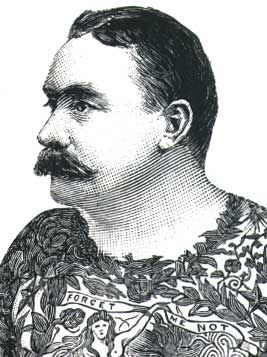Wednesday, November 30, 2005
Sunday, November 27, 2005
Mejillones en escabeche.
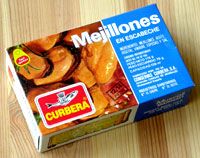 Mejillones en escabeche en lata. Beautiful, bright orange, fat and juicy mussels in a lovely oily orange sauce. A canned snack. Portable tapas; bring your own cocktail stick. Great for food on the go: bread, cheese and a can of these make a tasty picnic.
Mejillones en escabeche en lata. Beautiful, bright orange, fat and juicy mussels in a lovely oily orange sauce. A canned snack. Portable tapas; bring your own cocktail stick. Great for food on the go: bread, cheese and a can of these make a tasty picnic.Escabeche ('pickled') is a spicy marinade of Spanish origin, used to season and preserve fried (occasionally poached) fish and sometimes poultry. It consists of vinegar or lime juice, onions, peppers and spices. It's found with similar names in North Africa (scabetche), Jamaica (escovitch), Italy (escabecio or scavece) and South America (escabeche !).
 Here's a recipe for a delicious snack, using two tins of mejillones en escabeche and a 200g carton of Philadelphia cheese. Basically, you just beat the hell out of the lot and spread it on bread or toast. Fantastic. (You can add tuna or chopped hard-boiled egg, too.)
Here's a recipe for a delicious snack, using two tins of mejillones en escabeche and a 200g carton of Philadelphia cheese. Basically, you just beat the hell out of the lot and spread it on bread or toast. Fantastic. (You can add tuna or chopped hard-boiled egg, too.)In Spanish, the instructions read:
"Volcamos en un recipiente para batidora el queso de untar y las latas de mejillones. En un pis pás, nos ponemos a batir la mezcla como desesperados, y cuando lo tengamos bien batido, lo usaremos para untar rebanadas de pan normal o de molde."Babel Fish translates that as:
"We overturned in a container for beater the cheese to grease and tins of mejillones. In piss pás, we put ourselves to beat the mixture like desperate, and when we have or milkshake, we will use it to grease slices of normal bread or mold."A Spanish recipe for making your own Mejillones en Escabeche;
and lots of recipes for mejillones in general.
Friday, November 25, 2005
My 'Winky'.
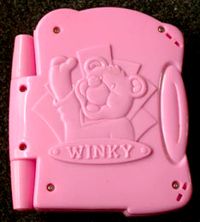 This is my new toy - it's called a 'WINKY'. Actually it's only borrowed, from a very young person. It teaches Spanish spelling, pronunciation and vocabulary. Of course, it's made for Spanish infants, but I'm no better. And every little bit helps. Good, isn't it, kids? ('ñ', but no 'ch' or 'll'?)
This is my new toy - it's called a 'WINKY'. Actually it's only borrowed, from a very young person. It teaches Spanish spelling, pronunciation and vocabulary. Of course, it's made for Spanish infants, but I'm no better. And every little bit helps. Good, isn't it, kids? ('ñ', but no 'ch' or 'll'?)Here's how to spell 'rana'.
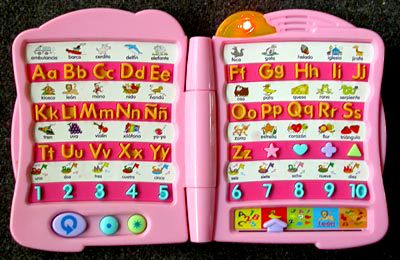 I've accumulated various Spanish learning tools over the years. My method is: least hard work, maximum pleasure - which means I start a lot. But, whenever I start a new course, I re-affirm the basics, and learn new bits not in other courses. The consequence is that I know bits from all over the place and a lot from the beginning but, so far, nothing much serious beyond the rudiments of the past tenses and slight encounters with the subjunctive.
I've accumulated various Spanish learning tools over the years. My method is: least hard work, maximum pleasure - which means I start a lot. But, whenever I start a new course, I re-affirm the basics, and learn new bits not in other courses. The consequence is that I know bits from all over the place and a lot from the beginning but, so far, nothing much serious beyond the rudiments of the past tenses and slight encounters with the subjunctive.Probably my all-time favourite is a 1977 second-year radio course by the BBC called 'Tal Como Es'. There are two tapes, each with ten interviews with Spanish people from all over the country in a variety of occupations and situations. I never get fed up with listening to it, because there's no English whatsoever, except (I think it's in this course) when a man who'd worked in Eastbourne says, "fregando platos, the washing-up".
 Apart from vinyl, cassette, video and CD courses, I've got books picked up from all over the place. This 'Dijes y Joyas' piece is from a 1929 course called 'Primeros Pinitos'. Of course all these old books make me very 'usted' inclined. But I've got others, like 'Diccionario de Argot Español', which is handy if you insult, or get insulted, a lot. Here is an online equivalent.
Apart from vinyl, cassette, video and CD courses, I've got books picked up from all over the place. This 'Dijes y Joyas' piece is from a 1929 course called 'Primeros Pinitos'. Of course all these old books make me very 'usted' inclined. But I've got others, like 'Diccionario de Argot Español', which is handy if you insult, or get insulted, a lot. Here is an online equivalent.This is a useful one, as you may already know. The 'Oxford-Duden Pictorial Spanish and English Dictionary' has 384 sections like the image below, each covering a separate subject, with drawings annotated in English and Spanish (29,000 items).
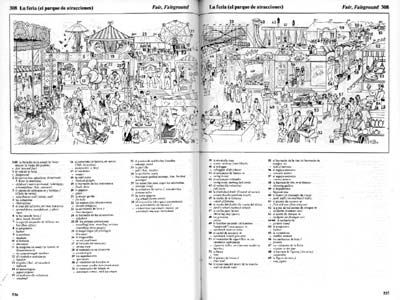
There have been times when my focus on learning the language was strong: attending regular classes, weekend courses and, once, a fortnight's course in Madrid. At a time of much immersion I experienced a feeling like having a window opened in the side of my head. I had a glimpse of understanding from a Spanish perspective. I believe in this feeling: a study of words and their derivation (etymology) reveals history and culture; with words developing and evolving from invasions, political changes, fashion changes and such. So, I think it a fair view that learning a language, with its imbued history and culture, must also precipitate a new way of seeing and understanding.

